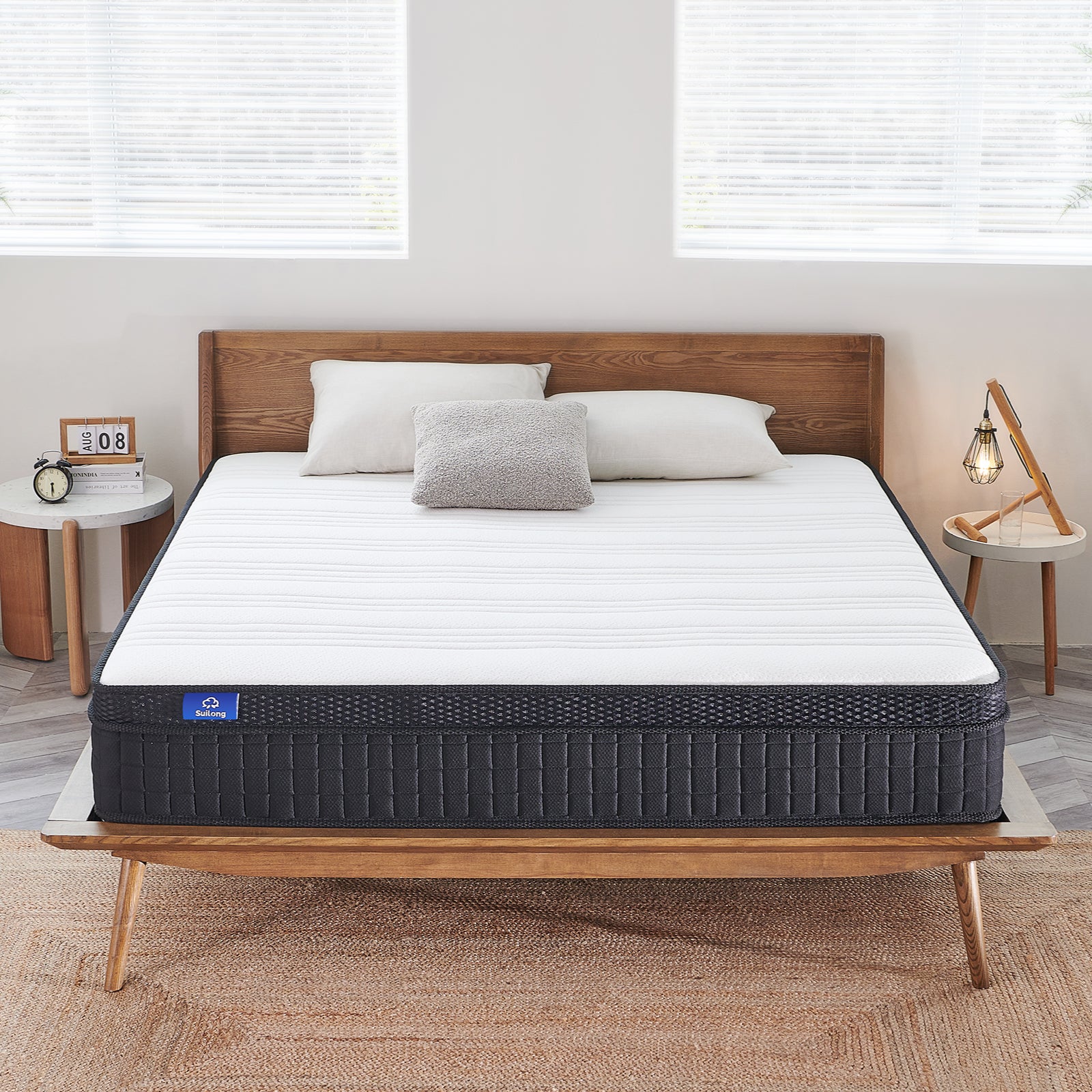How Do You Get Water Stains Out Of Bedding?

Discover expert tips on removing and preventing water stains from mattresses. Learn step-by-step cleaning methods for various mattress types, including memory foam and hybrid mattresses, and DIY stain remover recipes. Ideal for maintaining bedding cleanliness and quality.
Hello dear readers! As an expert in the mattress manufacturing industry for many years, today I'm going to share with you about effective ways on how to remove water stains from your bedding. As we all know, water stains not only affect the appearance of our mattresses, but also may affect the quality of our sleep. So, let's learn how to keep our mattress clean and tidy and enjoy a comfortable sleeping environment.
1. Causes of Water Stains
Firstly, let's explore the common causes of water stains on mattresses. In everyday life, accidental spills, children's bedwetting and even pet accidents can leave water stains on your mattress. Understanding the source of water stains helps us choose the most appropriate cleaning method. In addition, different types of water stains (e.g., coffee stains, juice stains or regular water stains) have different characteristics that determine the best strategy for removing them.
1.1 Common sources of water stains
There are many sources of water stains in our lives. For example, an accidentally spilled cup of coffee or a child's urine stain can be the source of water damage to a mattress. Understanding these common sources of water damage can be very helpful for both prevention and cleaning.
1.2 Characteristics of Different Water Stain Types
Different water stains have different characteristics. For example, protein stains (such as blood or urine stains) require cold water when removing them, while pigmented stains (such as juices or coffee stains) may require a specific cleaner to treat.
2. Step-by-step cleaning of water stains on mattresses
Now that you know the sources and types of water stains, I'm going to go over how to clean water stains from your mattress step-by-step. Whether you're dealing with a mattress in a box queen or a twin memory foam mattress, these steps are universal. The key is to treat it in a timely manner so that the water does not penetrate deeper into the mattress.
2.1 Preparation before cleaning
Firstly, prepare the necessary cleaning tools, such as a hoover, a clean cloth and a mild detergent. For mattresses made of special materials such as memory foam mattress or Hybrid Mattresses, make sure you use cleaning products that are safe for these materials.
2.2 Cleaning steps in detail
Next, clean your mattress as follows: first, vacuum the surface to remove dust and impurities; then, gently blot any water spots with a clean, damp cloth; if necessary, deep clean with an appropriate detergent; and finally, blot up any excess water with a dry cloth.
2.3 Caution
During the cleaning process, please take special care not to over-wet the mattress, especially for full size mattress in a box or king size mattress and box spring, as these mattresses are more difficult to thoroughly clean. as these mattresses are more difficult to dry thoroughly.
Now that you know how to clean water stains from your mattress, let's see how to make your own mattress stain remover.
3. Homemade Mattress Stain Remover Recipe
For those of you who prefer to make your own cleaners, here are some simple and effective homemade recipes. Not only are these recipes environmentally friendly, but they are also safe for many types of mattresses, such as memory foam mattresses or Hybrid Mattresses.
For example, a mixture of baking soda and water can be used to treat minor water stains. Baking soda is particularly effective in removing odours and light stains.
Another effective recipe is to use a mixture of one part laundry detergent and two parts water. This recipe is especially good for pigmented stains such as fruit juice or coffee stains.
When using these homemade cleaners, be sure to test them on an inconspicuous part of your mattress first to make sure they won't cause damage.
Next, we'll look at how to properly dry a treated mattress to ensure it's clean and safe.
4. Drying the mattress correctly
After cleaning your mattress, the correct drying process is crucial. A mattress that is not dry enough can become a breeding ground for bacteria and mould.
Firstly, make sure the room is well ventilated and you can use a fan or air conditioner to speed up the drying process.
If possible, placing the mattress in the sun to dry is also a good option; the sun's natural sterilising effect can help kill any remaining bacteria.
Remember not to use a hot air blower when working on a mattress in a box or any type of mattress, as excessive heat can damage the internal structure of the mattress.
Now that your mattress is clean and dry, let's look at how to prevent future water damage.
5. Preventing Mattress Water Damage
Prevention is always easier than cleaning. Here are some effective ways to prevent water damage to your mattress:
5.1 Daily Maintenance and Precautions
Change and wash bedding, such as sheets and mattress covers, regularly.
Consider using a waterproof mattress protector, especially for children's beds or mattresses that stain easily.
5.2 Quick response to accidental spillage
In the event of a spillage, immediate action is key. Quickly absorb as much liquid as possible with a clean cloth, then thoroughly clean the mattress using the cleaning methods mentioned earlier.
By taking these simple precautions, you can dramatically reduce the incidence of water damage on your mattress. Now that you have all the tips you need to clean and prevent water stains on your mattress, let's wrap up the day.
Dear reader, by sharing today, I hope you have mastered how to effectively remove water stains from your mattress and know how to prevent future stains. Whether your mattress is a mattress in a box queen, a twin memory foam mattress, or any other type, these cleaning and maintenance tips are universal. Remember, regular cleaning and maintenance of your mattress will not only prolong its life, but also provide you with a healthier and more comfortable sleeping environment.
Now, I'd like to invite you to share your own mattress cleaning tips and experiences in the comments section. If you have any questions or need more advice on home cleaning and maintenance, feel free to subscribe to our blog. Let's create a healthier and more comfortable home environment together!
Read More:
https://suilong.org/blogs/blogs/how-to-deep-clean-a-mattress-at-home
https://suilong.org/blogs/blogs/how-do-you-remove-dried-coffee-stains
https://suilong.org/blogs/blogs/how-do-you-remove-set-in-makeup-stains
FAQs
Q1: Can I use regular detergent to remove water stains from a memory foam mattress?
A1: It's best to use a mild detergent for memory foam mattresses. Harsh chemicals can damage the foam's structure.
Q2: How long should I leave baking soda on a water-stained mattress for effective cleaning?
A2: Leave baking soda on the stain for at least 30 minutes to absorb moisture and odors before vacuuming it off.
Q3: Are DIY stain removers safe for all types of mattresses, including hybrid mattresses?
A3: While most DIY removers are safe, it's always recommended to do a spot test on a small, inconspicuous area first.
Q4: What's the best way to dry a mattress quickly after cleaning a water stain?
A4: Use a fan or open windows for airflow. Avoid direct heat sources like blow dryers as they can damage the mattress.
Q5: How often should I check my mattress for water stains or damage?
A5: Regularly check when changing bed linens, ideally every 1-2 weeks, to catch and address any stains early.
Q6: Can sunlight help in removing water stains from mattresses?
A6: Yes, sunlight can aid in drying and naturally disinfecting the mattress, but prolonged exposure might fade the fabric.
Q7: Is it safe to use vinegar as a cleaning agent on mattresses?
A7: Yes, diluted vinegar is a safe and effective cleaner for most mattresses. However, always do a spot test first.
Q8: What should I do if the water stain on the mattress doesn't come out after cleaning?
A8: If the stain persists, consider a professional cleaning service or evaluate if the mattress needs to be replaced.
Q9: Can water stains on mattresses lead to mold or mildew?
A9: Yes, if not properly dried, water stains can lead to mold or mildew growth, which is harmful to health.
Q10: Are waterproof mattress protectors effective in preventing water stains?
A10: Absolutely. Waterproof protectors are an excellent way to safeguard your mattress against spills and stains.


















